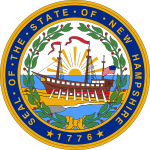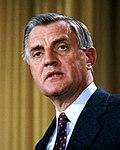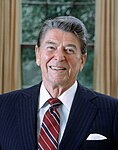
The 1984 United States presidential election was the 50th quadrennial presidential election held on Tuesday, November 6, 1984. Incumbent Republican president Ronald Reagan was re-elected to a second term defeating Democratic former vice president Walter Mondale in a landslide victory.

Each of the 50 U.S. states, the District of Columbia, and territories of the United States holds either primary elections or caucuses to help nominate individual candidates for president of the United States. This process is designed to choose the candidates that will represent their political parties in the general election.

Gary Warren Hart is an American politician, diplomat, and lawyer. He was the front-runner for the 1988 Democratic presidential nomination until he dropped out amid revelations of extramarital affairs. He represented Colorado in the United States Senate from 1975 to 1987.

The New Hampshire presidential primary is the first in a series of nationwide party primary elections and the second party contest, the first being the Iowa caucuses, held in the United States every four years as part of the process of choosing the delegates to the Democratic and Republican national conventions which choose the party nominees for the presidential elections to be held in November. Although only a few delegates are chosen in the New Hampshire primary, its real importance comes from the massive media coverage it receives, along with the first caucus in Iowa.

Super Tuesday is the United States presidential primary election day in February or March when the greatest number of U.S. states hold primary elections and caucuses. Approximately one-third of all delegates to the presidential nominating conventions can be won on Super Tuesday, more than on any other day. The results on Super Tuesday are therefore a strong indicator of the likely eventual presidential nominee of each political party.
In American politics, a superdelegate is a delegate to a presidential nominating convention who is seated automatically.

The 1984 Democratic National Convention was held at the Moscone Center in San Francisco, California from July 16 to July 19, 1984, to select candidates for the 1984 United States presidential election. Former Vice President Walter Mondale was nominated for president and Representative Geraldine Ferraro of New York was nominated for vice president. Ferraro became the first woman to be nominated by either major party for the presidency or vice presidency. In another first, the 1984 Democratic Convention was chaired by the female governor of Kentucky, Martha Layne Collins. The Democratic National Committee Chairman at the time, Charles T. Manatt, led the convention.
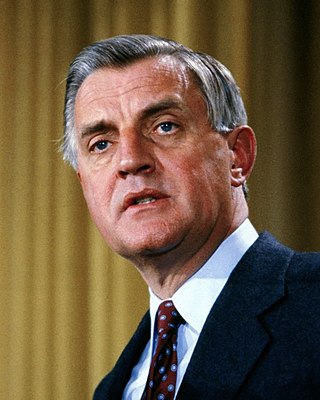
From February 20 to June 12, 1984, voters of the Democratic Party chose its nominee for president in the 1984 United States presidential election. Former Vice President Walter Mondale was selected as the nominee through a series of primary elections and caucuses culminating in the 1984 Democratic National Convention held from July 16 to July 19, 1984, in San Francisco, California.

From February 8 to June 14, 1988, voters of the Democratic Party chose its nominee for president in the 1988 United States presidential election.

The 2012 United States presidential election in New Hampshire took place on November 6, 2012, as part of the 2012 United States presidential election in which all 50 states plus the District of Columbia participated. New Hampshire voters chose four electors to represent them in the Electoral College via a popular vote pitting incumbent Democratic President Barack Obama and his running mate, Vice President Joe Biden, against Republican challenger and former Massachusetts Governor Mitt Romney and his running mate, Congressman Paul Ryan.
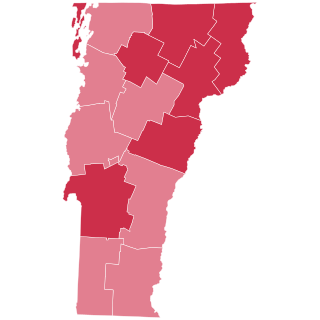
The 1984 United States presidential election in Vermont took place on November 6, 1984, as part of the 1984 United States presidential election, which was held throughout all 50 states and D.C. Voters chose three representatives, or electors to the Electoral College, who voted for president and vice president.

The 1984 United States presidential election in Hawaii took place on November 6, 1984. All 50 states and the District of Columbia, were part of the 1984 United States presidential election. Hawaii voters chose 4 electors to the Electoral College, which selected the president and vice president of the United States. Hawaii was won by incumbent United States President Ronald Reagan of California, who was running against former Vice President Walter Mondale of Minnesota. Reagan ran for a second time with former C.I.A. Director George H. W. Bush of Texas, and Mondale ran with Representative Geraldine Ferraro of New York, the first major female candidate for the vice presidency.

The 1984 United States presidential election in Iowa took place on November 6, 1984. All 50 states and the District of Columbia, were part of the 1984 United States presidential election. Voters chose eight electors to the Electoral College, which selected the president and vice president of the United States.

Noah Gerald Willis was an American businessman and politician who served in the Alabama House of Representatives from 1978 to 1982, and 1986 to 2002, as a member of the Democratic Party. Willis also sought the Democratic presidential nomination in the 1984 election.

This article lists those who were potential candidates for the Democratic nomination for vice president of the United States in the 1984 election. Former Vice President Walter Mondale won the 1984 Democratic nomination for president of the United States, and chose New York Representative Geraldine Ferraro as his running mate. Ferraro was the first woman to be a part of a national ticket for a major party. Mondale chose Ferraro in hopes of energizing the base and winning the votes of women, but also because he viewed her as a solid legislator who had won the approval of Speaker Tip O'Neill. The Mondale–Ferraro ticket ultimately lost to the Reagan–Bush ticket. This is the last time the Democratic vice presidential nominee was not the incumbent vice president or a senator, and, not counting the times when the incumbent president was running for re-election, the last time the Democratic vice presidential nominee was not a senator.

The Walter Mondale 1984 presidential campaign began on February 21, 1983, when Walter Mondale, a former Minnesota senator and vice president of the United States, announced that he was running for president in a speech at the Minnesota State Capitol. Mondale won the Democratic Party's presidential nomination after convincing Frank Lautenberg, a previously unpledged party delegate, to support him. Lautenberg's vote gave Mondale the 1,967 delegate votes needed to become the Democratic Party's nominee. Mondale picked Geraldine Ferraro, a U.S. representative from New York, as his running mate. Mondale lost the general election, held on November 6, 1984, to incumbent Republican President Ronald Reagan in a landslide. Had Mondale been elected, he would have been the first U.S. president from Minnesota and the first non-incumbent vice president since Richard Nixon to take office as president. Ferraro would also have been the country's first female vice president, and the first person from New York since Nelson Rockefeller to become vice president, whereas her husband, John Zaccaro, would also have been the country's first second gentleman.

In New Hampshire, United States, the communities of Dixville Notch, Hart's Location, and Millsfield all vote at the midnight beginning election day, known as the New Hampshire midnight votes, on the day of the state's political party primaries and general elections, following a tradition that started to accommodate railroad workers who had to be at work before normal voting hours. The voting tradition has been followed in Dixville Notch since the 1960 presidential election, in Hart's Location from 1948 to 1964 and from 1996 to 2020, and in Millsfield in 2016 and 2020.

The 1984 Iowa Democratic presidential caucuses took place on February 20 in Iowa, as usual marking the Democratic Party's first nominating contest in their series of presidential primaries ahead of the 1984 presidential election.
This is a list of endorsements for declared candidates in the Democratic primaries for the 1984 United States presidential election.

